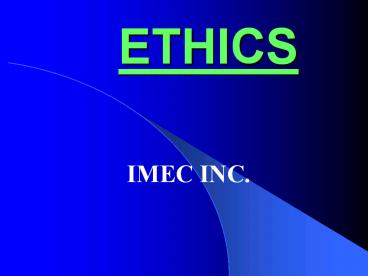Ethics for Medical Students - PowerPoint PPT Presentation
Title:
Ethics for Medical Students
Description:
(PRICE LOWERED)Complete Ethics for the USMLE – PowerPoint PPT presentation
Number of Views:230
Updated: 18 December 2015
Slides: 32
Provided by:
drstingrae
Category:
Medicine, Science & Technology
Tags:
Title: Ethics for Medical Students
1
ETHICS
- IMEC INC.
2
AUTONOMY
- Obligation of respect for patients individual
rights in preference to their personal wishes - Note this goes medical care
3
INFORMED CONSENT
- Legally requires
- Discussion of pertinent information
- Obtaining agreement for plan of care
- Freedom from coercion
- PT MUST UNDERSTAND RISKS, BENEFITS, AND
ALTERNATIVES, WHICH INCLUDE NO INTERVENTION BY
MEDICAL STAFF
4
EXCEPTIONS TO INFORMED CONSENT
- Patient lacks decision making capacity
- Implied consent in an emergency
- Therapeutic privilege- when a disclosure would
severely harm the patient - Waiver-when a patient waives the right
5
DECISION-MAKING CAPICITY
- Patient makes and communicates a choice
- Patient is informed
- Decision remains stable over time
- Decision is consistent with patients values
- Decision is not a result of delusion
6
WRITTEN ADVANCED DIRECTIVES
- Adults (ages 18 or older) who are mentally
competent have the right to make healthcare
decisions in advance. Advance directives state
your choices for medical treatment, especially in
regard to life-sustaining procedures. You can
also use advance directives to name a healthcare
agent, who is any person you choose, to make your
healthcare decisions if you are unable to do so.
Advance Directives only apply if you are unable
to make personal medical decisions, unless you
indicate you want your healthcare agent's
authority to begin when the document is signed.
You cannot be refused medical care because you do
not have advance directives.
7
ORAL ADVANCED DIRECTIVES
- Adults often make healthcare decisions during
discussions with their physicians. The physician
describes the options and explains the pros and
cons of each, but you make the final decision. - The same process can be used to decide about the
possible use of life-sustaining treatment and the
type of medical intervention you want, given
particular situations that might occur. - For example, you might decide in this way about
the use of CPR (cardiopulmonary resuscitation).
An oral advance directive is legally effective
and is to be honored by your healthcare
providers.
8
NONMALEFICENCE
- DO NO HARM
- Goes beyond this to the point of physician not
gaining anything from patient - Legally
- If a second party does not effect the wishes of
the first party - Very touchy ethical situation, under constant
scrutiny
9
BENEFICENCE
- Physician have a special ethical responsibility
(physician is fiduciary) - Patients autonomy may conflict with benficience
- The patient has the right to decide
- As long as the physician does not gain benefit
without the patient gaining an equal benefit
there is no discrepancy
10
CONFIDENTIALITY
- Disclosure to friends and relatives shouls be
guided to patients expectations - Privacy and autonomy
11
EXCEPTIONS TO CONFIDENTIALITY
- Potential harm to other or self
- No alternatives
- Physician can make attempts to
- Infectious disease (STATE)
- The Tarosoff Decision (PROTECTION)
- Child/elder abuse
- Impaired drivers
- Suicide/homicide
12
MALIPRACTICE
- Negligence
- Physician breach of duty
- Patient suffers harm as a result of breach
- Breach causes harm
13
20 Rules
14
Rule 1
- Competent Patients have the right to refuse
medical treatment
15
Rule 2
- Assume that the patient is competent unless clear
behavioral evidence indicates otherwise!
16
Rule 3
- Avoid going to court. Clinical decision making
should occur in the clinical setting whenever
possible.
17
Rule 4
- When surrogate must make decisions, use
- Substituted judgment
- Who best to represents the patient!
- Subjective standard
- What did the patient say in the past
18
Rule 5
- If the patient is incompetent the physician may
rely upon advanced directives, or living wills
19
Rule 6
- Feeding tube is a medical treatment that can be
removed at the patients request - CRUZAN 1990
20
Rule 7
- Do nothing to actively assist the patient to die
- Passiveallowing to dieOK
- Active---ordering something that would killnot OK
21
Rule 8
- The physician decides when the patient is dead!!
- No treatment options can help
- Situation is futile
22
Rule 9
- Never abandon the patient
- Lack of financial resources is not a reason to
stop treatment - An annoying patient is still your patient
23
Rule 10
- Full, informed consent requires that the patient
understands - Nature of the procedure
- The purpose or rationale
- Benefits
- Risks
- And available alternatives
24
Rule 11
- Special rules apply to children!
- If 13 YO and living by self, treat as an adult
- Marriage and the Military emancipates the child
as an adult
25
(No Transcript)
26
Rule 13
- Good Samaritan laws limit liability of a
competent physicians in a non-medical setting
27
(No Transcript)
28
Rule 15
- Patients should be given the chance to state DNR
(Do Not Resuscitate) in their chart
29
(No Transcript)
30
Rule 17
- Detain patients to protect themselves or others.
- Tarasoff Decision
31
(No Transcript)































